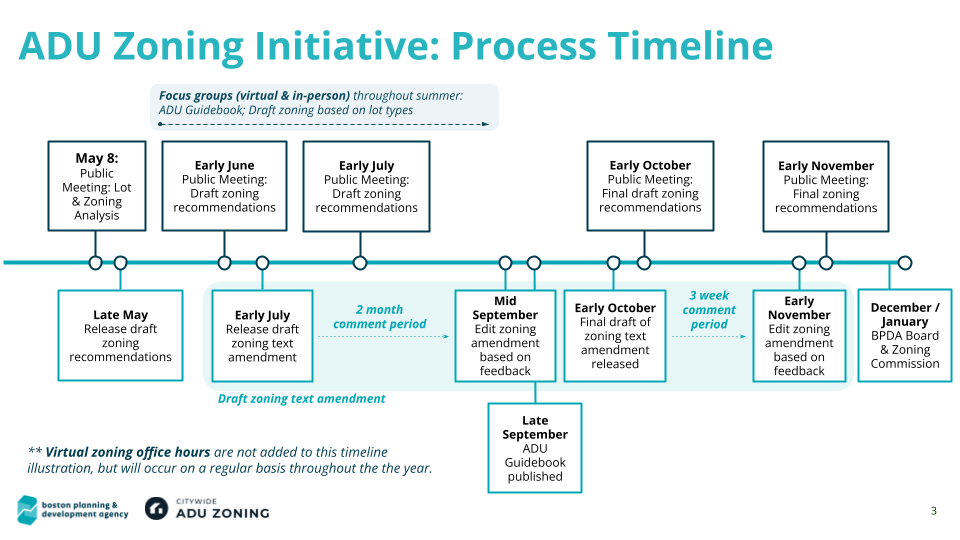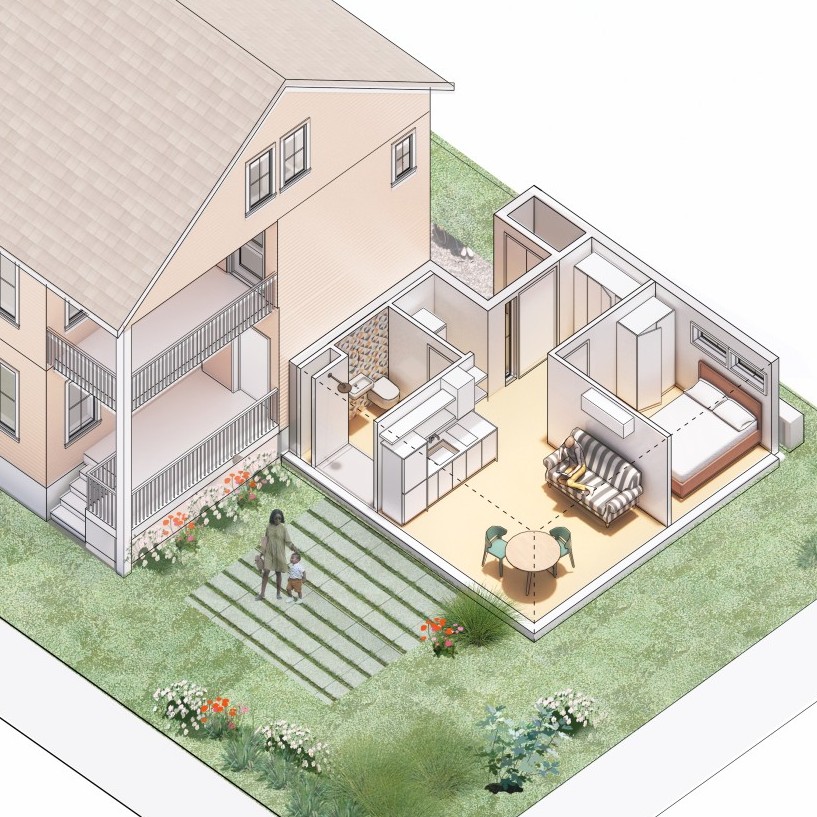Citywide ADU Zoning

The City of Boston and the BPDA are working to eliminate barriers to building Accessory Dwelling Units (ADUs) by updating zoning to make these small homes as-of-right citywide. The ADU program allows owner-occupants to build smaller, independent units inside their homes or in their yards. This initiative aims to expand lower-cost housing options, empower residents to build wealth, and foster diverse, multi-generational living spaces.
Get Involved
Upcoming Meetings
Wednesday, May 8, 2024 | Citywide Zoning for ADUs - Zoning Analysis Updates

The above timeline shows major project milestones over the course of Citywide ADU Zoning initiative. Please note that this timeline does not show all opportunities for public engagement and public meetings.
Wednesday, March 13, 2024
Citywide ADU Zoning: Kick Off Meeting | Presentation | Recording
What Are Accessory Dwelling Units?
Accessory Dwelling Units (ADUs) are additional residential units that can be built within an existing home or outside of it, such as in a smaller detached dwelling. ADUs allow homeowners to utilize their property to its fullest potential and support a household as it grows and changes over the years. Homeowners may opt to build an ADU so that family members can move close by, or to generate extra income through a rental unit.
ADUs are an important part of Boston’s housing production toolbox and can help ease Boston’s affordable housing crisis. ADUs simultaneously support flexibility in Boston’s housing stock—allowing homes to expand as families grow or relatives move in due to life events—while also adding much-needed new rental units to the neighborhood. ADUs are a type of naturally-occurring affordable housing because they are often developed by owner-occupants in response to a unique need that their household has. This may include, for example, the need to move an aging grandparent, or a recent graduate into the household.

The City currently has an ADU Program that allows owner-occupants to build an ADU using only existing space within their homes (such as within an unused attic or basement). The Boston Home Center and the Mayor’s Office of Housing also offer financing support and technical assistance for homeowners interested in building an ADU. Visit their website to learn more.
Zoning Reform
Boston’s current outdated zoning code does not actually reflect the existing building patterns throughout Boston’s neighborhoods. In fact, many of the buildings and uses that we know and love throughout our neighborhoods actually predate our zoning code entirely and are not reflected in the code’s regulations. This discrepancy between what the zoning code says and what is actually built means that pre-existing homes are not compliant with zoning.
Standard alteration or renovation projects—which are the types of project that ADUs would be classified as—very often have a lengthy permitting/approval process due to multiple zoning violations that need to receive variances. Boston’s outdated zoning makes the development process for small-scale residential projects, including ADUs and other homeowner-led renovations, complicated and expensive. The BPDA is launching a residential zoning reform initiative that will focus on modernizing residential zoning to match what is already built throughout Boston’s neighborhoods and allow for additional housing where more density makes sense. Updated zoning regulations that match existing conditions will make it easier to build the type of small-scale residential projects, including ADUs, that will help support Bostonians’ housing needs.
Types of ADUs that will be supported through zoning reform:
Detached ADUs
Detached ADUs are separate, smaller residential units that are built on the same lot as an existing home. Detached ADUs may be newly constructed or renovated pre-existing structures (such as a garage).
Non-Detached ADUs
Non-Detached ADUs are built as additions to existing homes. They may utilize pre-existing space (like an attic or basement) or add onto the building through new construction.
Residential Zoning Reform to Allow ADUs in Mattapan
Mattapan’s residential zoning code was recently amended to allow for the by-right development of ADUs, including detached ADUs, on owner-occupied residential lots. Guided by the planning recommendations for residential areas in PLAN: Mattapan, the most recent neighborhood plan, Mattapan’s new residential zoning modernizes the residential code to reflect existing building patterns, supports contextual small-scale housing development, and allows for the by-right development of ADUs on residential lots. You can read more about the zoning changes here.